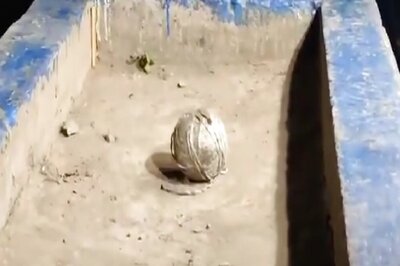
views
New Delhi: The Supreme Court will on Monday hear a petition seeking to restrain the central government from setting up any new nuclear plants till an analysis of their safety and cost benefits is carried out. An apex court bench of Chief Justice S.H. Kapadia, Justice A.K. Patnaik and Justice Swatanter Kumar would hear the petition by NGOs Common Cause, Centre for Public Interest Litigation, 12 former bureaucrats, including former cabinet secretary T.S.R. Subramanian and former Indian Navy chief Admiral Laxminarayan Ramdas.
The petitioners opposed the setting up of nuclear plants that India planned to build in association with other countries in the wake of India-US nuclear deal. Under "the pressure of foreign countries and the multi-billion dollar nuclear industry, the government has been pushing forward an expensive, unviable and dangerous nuclear power programme without proper safety assessment and without a thorough comparative cost-benefit analysis vis-a-vis other sources of energy, especially renewable sources", said the petition.
"The recent Fukushima nuclear disaster in Japan has turned out far graver than originally feared. The reactors and overheated spent-fuel pools have spewed radioactivity that has now spread over hundreds of square kilometre. Tens of thousands of people have had to be evacuated from a 30 km radius and beyond," the petition said.
The disaster would cost Japan hundreds of billions of dollars and make a large area uninhabitable. The cost of repairs and finding new sources of electricity were estimated to be more than a whopping $25 billion. The Fukushima disaster highlighted, 25 years after the Chernobyl nuclear disaster in the Ukraine April 26, 1986, the inherent hazards of nuclear power generation, the petition said.
It referred to reports which said that the legacy of radiation at Chernobyl would last centuries and claim hundreds of thousand more victims than in Japan's Hiroshima and Nagasaki cities, where atom bombs were dropped in 1945 to end World War II.
"Even a highly industrialised country with a good industrial safety record like Japan could not anticipate and control these hazards. After the Fukushima disaster Germany, Italy and Switzerland have announced a complete withdrawal from further use of nuclear power. Japan is also considering phasing out its nuclear plants," the petition said.
The petition said that not only does India have a poor industrial safety track record but also a dismal post-disaster management system as was evident from the 1984 Bhopal gas tragedy and from numerous railway accidents and earthquakes.
"If, for example, people from within 30 km radius of the nuclear plant in Narora, Uttar Pradesh, (which is about 150 km from Delhi) have to be evacuated, then that would mean rehabilitating tens of millions of internal refugees, which in all likelihood would prove to be impossible," it said.
In the aftermath of the Fukushima disaster, the secretary of the Department of Atomic Energy, who is also the chairman of the Atomic Energy Commission, said that Indian nuclear plants were "one hundred percent safe", the petition said.
"Such a statement without being based on facts or on assessment is intended to mislead the people in this county. It also shows that the Indian establishment has completely shut its eyes to the issue of nuclear safety," the petition said.
"Most of the nuclear reactors and equipment for which import orders are being made are of extremely dubious quality and safety standards," the petition said.
The petition pointed to the proposed "Jaitapur nuclear power plant (considered to be the world's largest) as a case study to highlight the mindless decision-making in recent times".
While seeking to declare the Civil Liability for Nuclear Damage Act, 2010 as unconstitutional, the petitioners sought the setting up of an independent expert body to conduct a thorough safety assessment of all existing and proposed nuclear facilities and cost benefit analysis of nuclear power vis-a-vis other sources of energy.




















Comments
0 comment